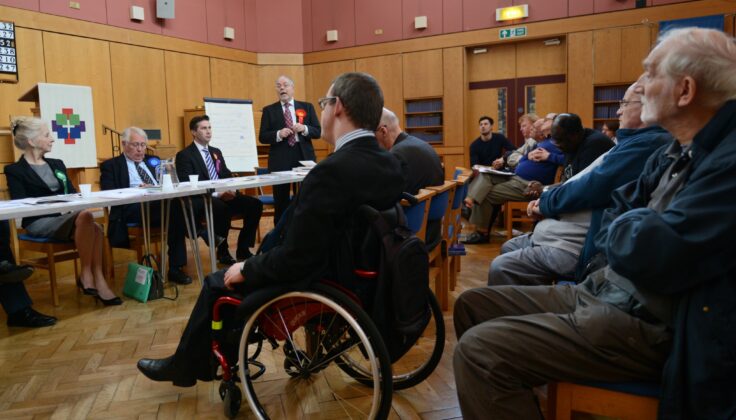Organise an Election Husting
A hustings is a meeting where election candidates debate policies and answer questions from the audience. A great opportunity to secure commitments and build relationships

What is an Election Husting?
A husting is a meeting where election candidates or parties debate policies and answer questions from the audience. Hustings allow voters to hear the views of candidates or parties. This is our chance to make our voices heard and to hold those in power accountable. Don’t miss out!
Let’s Grill the Candidates!
As Deaf and Disabled people’s organisations, we know that political hustings can often be inaccessible to our communities. We also know that our voices are often unheard in the political arena. That’s why we’re calling on you to organise hustings specifically for Deaf and Disabled voters!
Spread the word and invite the press
Let’s encourage a large turnout for the husting! A high attendance will increase the event’s credibility, attract media attention, and promote community involvement.
Who are the candidates to invite
To find the list of candidates running for election in your area along with their contact details, please click on the link and enter your postcode Who Can I Vote For?
Template email to invite election candidates to a husting
Dear [Candidate Name],
We are excited to extend an invitation to you to join an election hosting [insert date] hosted by our local Deaf and Disabled People’s Organisation (DDPO). This event will provide a platform for you to present your inclusive vision and interact with Disabled voters on issues of paramount importance.
Our community has been one of the hardest hit by austerity, the COVID pandemic and the cost-of-living crisis. We are disproportionately living in poverty, achieving poorer outcomes in education and far more likely to be unemployed or earn less. Public transport, technology, housing, street space, cultural and sports venues and activities remain inaccessible for many of us.
Our goal is for all Disabled Londoners to have a decent standard of living without having to rely on food banks. Moreover, they should be able to trust the police and receive adequate support when experiencing disability hate crimes. Although this is not the reality we currently live in, it is achievable.
I look forward to hearing from you.
Yours sincerely,
[Your Name]
[Your Organisation Name]
Read our Manifesto here
Hustings Planning Guide
Please find below an outline of how to structure your hustings. This is a template to help you plan your event, so feel free to adapt it to suit your needs.
- A hustings event typically lasts between 90 minutes and 2 hours.
- An effective chairperson is vital for an election husting. They must keep candidates on track, facilitate a fair and respectful debate, handle audience questions, and manage time.
Welcome (10 mins)
The chairperson gives a brief introduction, including Zoom guidelines if it is online. Explain that you will be giving ample time for audience questions.
Questions from the chairperson to candidates (25 – 35 mins)
Key Consideration: Adapt the number of chair-led questions based on the number of participating candidates. Remember, prioritise ample time for audience questions.
- We all want to be able to travel safely, affordably and accessibly. Yet, almost any outing can become a challenge because disabling barriers are everywhere. What actions will you take to make this a reality for all Deaf and Disabled Londoners?
- Many Disabled Londoners are currently living in homes that are unsafe, inaccessible, and too expensive. Many of us have been waiting for years for a safe and accessible property through the council housing waiting list. How will you massively increase the supply of accessible social rent homes in London?
- What will you do to ensure that Deaf and Disabled Londoners have equal access to education and employment opportunities, including adult education, apprenticeships, and secure jobs?
- Many Disabled Londoners are struggling to make ends meet and are being forced to choose between eating and heating. What actions will you take to support Disabled Londoners through the current cost-of-living crisis?
- Too many Disabled people feel unsafe in London – we experience abuse because we are Disabled, and often, we are not believed and supported by the police when this happens/reporting crimes. What are your plans to tackle disability hate crime in London, and what actions will you take to tackle disablism in the Met Police to ensure that all Disabled Londoners feel they can trust the police and report crimes?
Audience Questions & Answers (45 mins)
Leave ample time for audience Q&A.
Chairperson closes hustings (5 mins).
Essential Tips for Impartial Hustings
The Electoral Commission has released a guide for organising hustings, which you can access by clicking on the link “Are you holding a hustings? Key tips include:
- Charities must not support or oppose any particular political party or candidate.
One way of making sure that a charity does not do this is to hold non-selective hustings featuring candidates from as wide a political spectrum as possible. - Avoid Biased Language:
Use objective and non-partisan language when discussing election-related topics. Avoid making subjective statements or expressing personal opinions that could influence voters’ decisions. - Disclose Conflicts of Interest:
If you have personal or professional connections to political parties or candidates, clarify it to your audience. This transparency builds trust and ensures that your impartiality is not compromised. - Avoid Promoting Specific Parties or Candidates:
Refrain from explicitly endorsing or promoting any particular political party or candidate. - Allow each candidate or party representative attending a fair chance to answer questions and, where appropriate, a reasonable opportunity to respond to points made against them by other candidates or party representatives.
You can find more information about maintaining impartiality during a general election by clicking this link: Campaigning at election time – What you need to know.